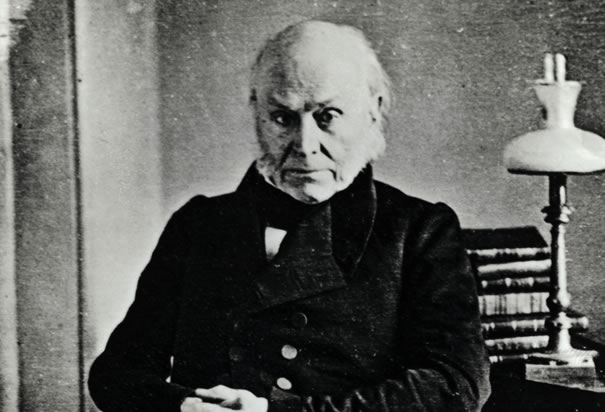what aspect of presidential election did andrew jackson try but fail to achieve
The Successes and Failure of John Quincy Adams
The public career of John Quincy Adams poses this paradox: he was the greatest ever Secretarial assistant of State only but a mediocre President. As Secretarial assistant of Country, he concluded the Adams-Onis treaty with Spain and the 1818 convention with Great britain. Both were diplomatic triumphs, gaining Florida for the U.s. and resolving border disputes with both nations. He was the builder of the Monroe doctrine, the cornerstone of American foreign policy in this hemisphere until the present day. He articulated more eloquently than whatever other Secretary of Country a preference for America'southward soft power over military deployment. The United states of america, he said, "goes non away in search of monsters to destroy. She is the well-wisher to the freedom and independence of all. She is the champion and vindicator only of her own. She volition recommend the full general crusade, by the countenance of her voice, and the benignant sympathy of her instance."
John Quincy Adams' presidency was a disappointment. He did take a vision of potent federal leadership in internal improvements and scientific innovation—what we today would term public goods. Merely with few notable exceptions, like the building of the Cumberland Road, he was unsuccessful in persuading Congress to adopt his programme. Despite beingness elected past the Business firm afterwards failing to win a majority of either the electoral or popular vote, he did nothing to aggrandize his coalition and was handily defeated past Andrew Jackson in the side by side presidential election.
Fred Kaplan's biography, John Quincy Adams: American Visionary, provides a vivid and full business relationship of the life of our sixth president but offers relatively sparse assay to help explicate these political vicissitudes. As a result, the biography, while informative and very well structured, falls short of the excellence of recent biographies of great American statesmen similar Ron Chernow's Alexander Hamilton or Walter Stahr's Seward: Lincoln's Indispensable Man. In Kaplan's work, the narrative, written largely from Adams' perspective, limits the scope for analysis. It sometimes slights the more than general historical context and is frequently trapped past a sympathy verging on partisanship for the field of study. Fortunately, Kaplan'due south narrative is sufficiently rich that it permits us to make our own explanations for the arc of Adams' career.
Adams' success as Secretarial assistant of State and his failure every bit President were the consequence both of his time and his personality. He was Secretary of Land under James Monroe in the era of Adept Feelings when the Autonomous-Republican Party dominated regime as has no other party in American history. As a result, Adams was able to get support for the political compromises that helped him ratify fundamental treaties. Past the time he assumed the Presidency, the political party had split into factions, and the ascendant 1, extremely suspicious of federal power, was returning to its roots in the philosophy of Thomas Jefferson, the political nemesis of John Quincy's begetter. Adams thus took role under much less favorable circumstances than did Monroe, even setting bated the loss of legitimacy that came from winning in the House rather than in electoral college.
And Adams' personality fabricated it difficult for him to accommodate to the new circumstances of factional politics. In dealing with foreign nations, he recognized that he was in the realm of pragmatism rather than pure principle. He had been a diplomat for almost his whole life, beginning equally secretary to the Russian federation legation at age fourteen. These formative experiences gave him an appreciation for the inevitable give-and-take of international bargaining.
Simply domestically, Adams was a moralist: in his view, the United States polity should reflect certain principles of liberty and common practiced that were not field of study to compromise. The principles were on the whole admirable, simply on the issue of slavery they were non shared throughout the union, and in that location was disagreement on how to apply them fifty-fifty on less momentous issues. Adams had a tendency to demonize his opponents rather than look for common basis. He was the kind of confidence politician who tin can succeed as a leader of the nation only when the fourth dimension is ripe for key change.
The aforementioned unbending principles that crippled his Presidency led to the near successful post-Presidency in the history of the United states. Kaplan well describes how, every bit a fellow member of the House of Representatives for virtually two decades, Adams spoke relentlessly against slavery and in detail confronting the "gag dominion" by which Southerners tried to prevent Congress from discussing anything to practise with the issue. Adams may take been the Firm of Representatives' most effective conviction politician: he leveraged his continuing as an ex-President to be heard throughout the land in the crusade of liberty—both of speech and of labor.
The most original role of Kaplan's biography lies in his revelations about Adams' literary accomplishments. At one a time a professor of rhetoric at Harvard, Adams rivals Abraham Lincoln as a master of prose and wrote far more on more than diverse subjects from theology to scientific discipline. And if Richard 2 was the poet king, Adams was certainly was our poet President. Unlike his contemporary John Calhoun, who was said to accept had the good sense to cease versifying afterwards starting time with the word "Wherefore," Adams wrote more than than competent verse, using his verse to explore both the everyday and the transcendent. Adams was not a successful President, but few leaders of whatever autonomous nation accept possessed a more capacious intellect or sounder principles.
Source: https://lawliberty.org/the-successes-and-failure-of-john-quincy-adams/

0 Response to "what aspect of presidential election did andrew jackson try but fail to achieve"
Post a Comment